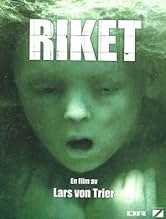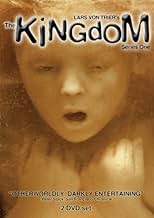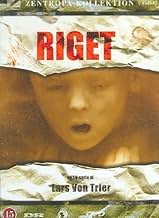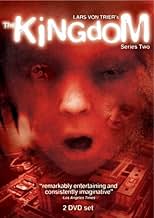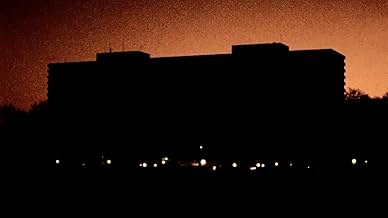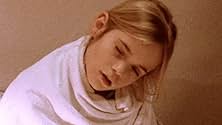I medici di un ospedale ultramoderno in Danimarca si convincono, per mezzo di strani e inspiegabili avvenimenti, che il luogo è infestato.I medici di un ospedale ultramoderno in Danimarca si convincono, per mezzo di strani e inspiegabili avvenimenti, che il luogo è infestato.I medici di un ospedale ultramoderno in Danimarca si convincono, per mezzo di strani e inspiegabili avvenimenti, che il luogo è infestato.
- Premi
- 20 vittorie e 7 candidature totali
Sfoglia gli episodi
Recensioni in evidenza
I didn't like Riget I much. It was boring, and horror stories like that had been told a thousand times before. On the positive side, Stig Helmer was one of the most memorable characters ever, and he was even better than he was in the second series. Kudos to Jaregard for an outstanding interpretation. Also on the positive side, some things were funny (Helmer with the car rims) and some were genuinely absurd (where Krogshoj lives). But overall, Riget remained well inside the boundaries of the horror genre, and the narration didn't reach the critical point where everything becomes art.
Now Riget II, a masterpiece. The second series expresses all the unrealized potential of the first one. The tone is consistently grotesque, each action and interaction is quite absurd, and all the bonds with reality have been cut. There's no suspension of disbelief anymore, because everything is obviously surreal. Still, the audience is hooked till the end following a plot that is part crazy, part logical and compelling. There's much more humor and much more horror than there was in the first series, allowing the film to reach that critical point where contrast between tones and genres creates a rich canvas of relationships and meanings. You will smile at the electric car, believe the zombie poison, and listen to extremely deep pieces of philosophy by the dishwashers and Lars von Trier himself. The last scene with Little Brother is painful and hilarious at the same time, while flirting with a cosmological, universal, spiritual significance: hats off. You will also witness delightful, unbelievable situations, that make perfectly sense within the plot: this is a subtle form of art that started to reach its full potential in the nineties.
I watched Riget II before year 2000 for the first time, and then recently watched it again. At the time, I was quite shocked by its originality. Many things that von Trier did here spread around later in film making: I think this series was really ahead of the times. For example, I could not but notice the similarities between Riget II and "Arrested Development", the comedy series: camera work, editing, jumps between scenes and subplots, dry humor, over the top characters, lots of things were exactly the same. It's like Von Trier developed a language to imagine and handle absurd situations with ease; you can notice the obvious progress he made from Riget I to II.
Now Riget II, a masterpiece. The second series expresses all the unrealized potential of the first one. The tone is consistently grotesque, each action and interaction is quite absurd, and all the bonds with reality have been cut. There's no suspension of disbelief anymore, because everything is obviously surreal. Still, the audience is hooked till the end following a plot that is part crazy, part logical and compelling. There's much more humor and much more horror than there was in the first series, allowing the film to reach that critical point where contrast between tones and genres creates a rich canvas of relationships and meanings. You will smile at the electric car, believe the zombie poison, and listen to extremely deep pieces of philosophy by the dishwashers and Lars von Trier himself. The last scene with Little Brother is painful and hilarious at the same time, while flirting with a cosmological, universal, spiritual significance: hats off. You will also witness delightful, unbelievable situations, that make perfectly sense within the plot: this is a subtle form of art that started to reach its full potential in the nineties.
I watched Riget II before year 2000 for the first time, and then recently watched it again. At the time, I was quite shocked by its originality. Many things that von Trier did here spread around later in film making: I think this series was really ahead of the times. For example, I could not but notice the similarities between Riget II and "Arrested Development", the comedy series: camera work, editing, jumps between scenes and subplots, dry humor, over the top characters, lots of things were exactly the same. It's like Von Trier developed a language to imagine and handle absurd situations with ease; you can notice the obvious progress he made from Riget I to II.
The closest that American television has even come close to "The Kingdom" was the recent Stephen King mini-series "Storm of the Century." Still, even this was nowhere near as engaging as this Danish mini-series. Practically none of this would ever get through through censors here.
Loopy hospital drama, restless spirits, an incubus, Voodoo... it's all here, it all makes perfect sense and it is a series that leaves one screaming for more when it ends (I will be scouring this city for "The Kingdom II" before the week is over). I won't ruin a bit of it, other than to say the closing scene shocked me so much that my original critical summery cannot be printed here. Truly amazing film-making, and definitely a glimpse of what television could be without all the censors and constant pandering to the lowest common denominator.
Loopy hospital drama, restless spirits, an incubus, Voodoo... it's all here, it all makes perfect sense and it is a series that leaves one screaming for more when it ends (I will be scouring this city for "The Kingdom II" before the week is over). I won't ruin a bit of it, other than to say the closing scene shocked me so much that my original critical summery cannot be printed here. Truly amazing film-making, and definitely a glimpse of what television could be without all the censors and constant pandering to the lowest common denominator.
10AdFin
Acclaimed director Lars Von Trier came to Riget (The Kingdom) after the failure of his film Europa (1991) and some trouble with his personal life, weather these contrasting elements had anything to do with the set up of the story of the Kingdom is unknown, but it might explain the playfulness of the film. This was the first time that von Trier would use the documentary-style approach he continued in his Dogme film The Idiots (1998) and with this project it worked wonders at enriching the source material with a certain satire. We except straight away that these bizarre occurrences are actually happening in the largest hospital in Denmark (The Kingdom of the title) and we have no reason to doubt it. As well as visual style, the characterisation is also good, Von Trier and fellow writers Tomas Gíslason and Niels Vørsel understand that we need to be interested in the characters of a TV show if we are to follow them for the duration of the series, and the characters in The Kingdom are no exception. We have at the focus of the action Dr Helmer played by the late Ernst-Hugo Järegård, a Swede with a troubled past who despises the hospital and it's practices, his recurring catchphrase "Bloody Danes" is a memorable addition to the proceedings. But more importantly is the character of Mrs Drusse (Kirsten Rolffes), the Ms Marple type character who's strange visions of the ghostly young Mary set the ball rolling. All of the actors are perfectly cast and have a great time mixing the surreal horror with the more comedic moments. Having seen both series of the Kingdom, I would say that series two is much better, perhaps because by this time we have a better grasp on the characters, but that by no way means that series one isn't just as good, let's not forget just how important a stepping stone it is. With this one Von Trier and co-director Morten Arnfred created a modern TV masterpiece. 10/10
Few films have had me in their grip as von Trier's THE KINGDOM. Difficult to describe in words. Basically a horror epic that takes you to a hospital that no self-respecting human would set foot in. The camerawork is a real feat of genius. Why? Well, for such jerky movement to hold my attention for 4 AND ONE HALF HOURS I have nothing but admiration.
And it made me want to see Part II immediately after! Come to think of it, if Lars wanted to, he could have made it a week long marathon and I would have forgone sleep to see it's conclusion! Bring me buckets of espresso and bags of sugar! I ain't goin' anywhere.........
And it made me want to see Part II immediately after! Come to think of it, if Lars wanted to, he could have made it a week long marathon and I would have forgone sleep to see it's conclusion! Bring me buckets of espresso and bags of sugar! I ain't goin' anywhere.........
Simply one of the best and most original European tv series ever. So original, clever and visually groundbreaking it was way ahead of its time. Dont miss this one!
Lo sapevi?
- QuizFor the German-speaking markets, 'Riget' was translated into 'Hospital der Geister - The Kingdom', as a direct translation, 'Das Reich', for obvious reasons was deemed inappropriate.
- BlooperHelmer procures hot coffee, and enters the archive. Mogge returns, with Krogshøj, and they lock Helmer in - he's left standing with a cup of scalding coffee - he can't move with setting off the infra-red alarm sensors. He's left, statue-like, staring at his cup of steaming liquid. Cut to Drusse and Bulder. She says she has to perform a seance for some doctors, and tells Bulder that in 1 hour, they are to attempt to enter the archive. When they get there, they inadvertently liberate Helmer, who casts away his cup of still scalding, yet hour-old coffee.
- Versioni alternativeOriginally shown as a TV miniseries in 4 episodes. A slightly longer theatrical version was released abroad after the TV premiere.
- ConnessioniFeatured in I Lars von Triers rige - en mand og hans tv-serie (1994)
I più visti
Accedi per valutare e creare un elenco di titoli salvati per ottenere consigli personalizzati
- How many seasons does The Kingdom have?Powered by Alexa
Dettagli
- Data di uscita
- Paesi di origine
- Lingue
- Celebre anche come
- The Kingdom
- Luoghi delle riprese
- Aziende produttrici
- Vedi altri crediti dell’azienda su IMDbPro
Contribuisci a questa pagina
Suggerisci una modifica o aggiungi i contenuti mancanti





